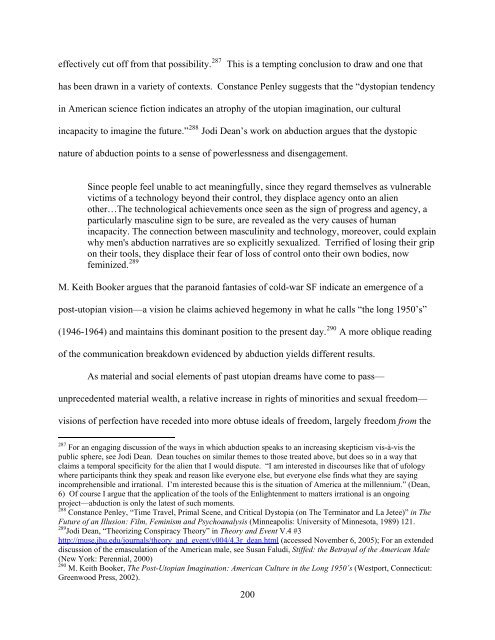A Genealogy of the Extraterrestrial in American Culture
A Genealogy of the Extraterrestrial in American Culture
A Genealogy of the Extraterrestrial in American Culture
Create successful ePaper yourself
Turn your PDF publications into a flip-book with our unique Google optimized e-Paper software.
effectively cut <strong>of</strong>f from that possibility. 287<br />
This is a tempt<strong>in</strong>g conclusion to draw and one that<br />
has been drawn <strong>in</strong> a variety <strong>of</strong> contexts. Constance Penley suggests that <strong>the</strong> “dystopian tendency<br />
<strong>in</strong> <strong>American</strong> science fiction <strong>in</strong>dicates an atrophy <strong>of</strong> <strong>the</strong> utopian imag<strong>in</strong>ation, our cultural<br />
<strong>in</strong>capacity to imag<strong>in</strong>e <strong>the</strong> future.” 288 Jodi Dean’s work on abduction argues that <strong>the</strong> dystopic<br />
nature <strong>of</strong> abduction po<strong>in</strong>ts to a sense <strong>of</strong> powerlessness and disengagement.<br />
S<strong>in</strong>ce people feel unable to act mean<strong>in</strong>gfully, s<strong>in</strong>ce <strong>the</strong>y regard <strong>the</strong>mselves as vulnerable<br />
victims <strong>of</strong> a technology beyond <strong>the</strong>ir control, <strong>the</strong>y displace agency onto an alien<br />
o<strong>the</strong>r…The technological achievements once seen as <strong>the</strong> sign <strong>of</strong> progress and agency, a<br />
particularly mascul<strong>in</strong>e sign to be sure, are revealed as <strong>the</strong> very causes <strong>of</strong> human<br />
<strong>in</strong>capacity. The connection between mascul<strong>in</strong>ity and technology, moreover, could expla<strong>in</strong><br />
why men's abduction narratives are so explicitly sexualized. Terrified <strong>of</strong> los<strong>in</strong>g <strong>the</strong>ir grip<br />
on <strong>the</strong>ir tools, <strong>the</strong>y displace <strong>the</strong>ir fear <strong>of</strong> loss <strong>of</strong> control onto <strong>the</strong>ir own bodies, now<br />
fem<strong>in</strong>ized. 289<br />
M. Keith Booker argues that <strong>the</strong> paranoid fantasies <strong>of</strong> cold-war SF <strong>in</strong>dicate an emergence <strong>of</strong> a<br />
post-utopian vision—a vision he claims achieved hegemony <strong>in</strong> what he calls “<strong>the</strong> long 1950’s”<br />
(1946-1964) and ma<strong>in</strong>ta<strong>in</strong>s this dom<strong>in</strong>ant position to <strong>the</strong> present day. 290 A more oblique read<strong>in</strong>g<br />
<strong>of</strong> <strong>the</strong> communication breakdown evidenced by abduction yields different results.<br />
As material and social elements <strong>of</strong> past utopian dreams have come to pass—<br />
unprecedented material wealth, a relative <strong>in</strong>crease <strong>in</strong> rights <strong>of</strong> m<strong>in</strong>orities and sexual freedom—<br />
visions <strong>of</strong> perfection have receded <strong>in</strong>to more obtuse ideals <strong>of</strong> freedom, largely freedom from <strong>the</strong><br />
287 For an engag<strong>in</strong>g discussion <strong>of</strong> <strong>the</strong> ways <strong>in</strong> which abduction speaks to an <strong>in</strong>creas<strong>in</strong>g skepticism vis-à-vis <strong>the</strong><br />
public sphere, see Jodi Dean. Dean touches on similar <strong>the</strong>mes to those treated above, but does so <strong>in</strong> a way that<br />
claims a temporal specificity for <strong>the</strong> alien that I would dispute. “I am <strong>in</strong>terested <strong>in</strong> discourses like that <strong>of</strong> ufology<br />
where participants th<strong>in</strong>k <strong>the</strong>y speak and reason like everyone else, but everyone else f<strong>in</strong>ds what <strong>the</strong>y are say<strong>in</strong>g<br />
<strong>in</strong>comprehensible and irrational. I’m <strong>in</strong>terested because this is <strong>the</strong> situation <strong>of</strong> America at <strong>the</strong> millennium.” (Dean,<br />
6) Of course I argue that <strong>the</strong> application <strong>of</strong> <strong>the</strong> tools <strong>of</strong> <strong>the</strong> Enlightenment to matters irrational is an ongo<strong>in</strong>g<br />
project—abduction is only <strong>the</strong> latest <strong>of</strong> such moments.<br />
288 Constance Penley, “Time Travel, Primal Scene, and Critical Dystopia (on The Term<strong>in</strong>ator and La Jetee)” <strong>in</strong> The<br />
Future <strong>of</strong> an Illusion: Film, Fem<strong>in</strong>ism and Psychoanalysis (M<strong>in</strong>neapolis: University <strong>of</strong> M<strong>in</strong>nesota, 1989) 121.<br />
289 Jodi Dean, “Theoriz<strong>in</strong>g Conspiracy Theory” <strong>in</strong> Theory and Event V.4 #3<br />
http://muse.jhu.edu/journals/<strong>the</strong>ory_and_event/v004/4.3r_dean.html (accessed November 6, 2005); For an extended<br />
discussion <strong>of</strong> <strong>the</strong> emasculation <strong>of</strong> <strong>the</strong> <strong>American</strong> male, see Susan Faludi, Stiffed: <strong>the</strong> Betrayal <strong>of</strong> <strong>the</strong> <strong>American</strong> Male<br />
(New York: Perennial, 2000)<br />
290 M. Keith Booker, The Post-Utopian Imag<strong>in</strong>ation: <strong>American</strong> <strong>Culture</strong> <strong>in</strong> <strong>the</strong> Long 1950’s (Westport, Connecticut:<br />
Greenwood Press, 2002).<br />
200















